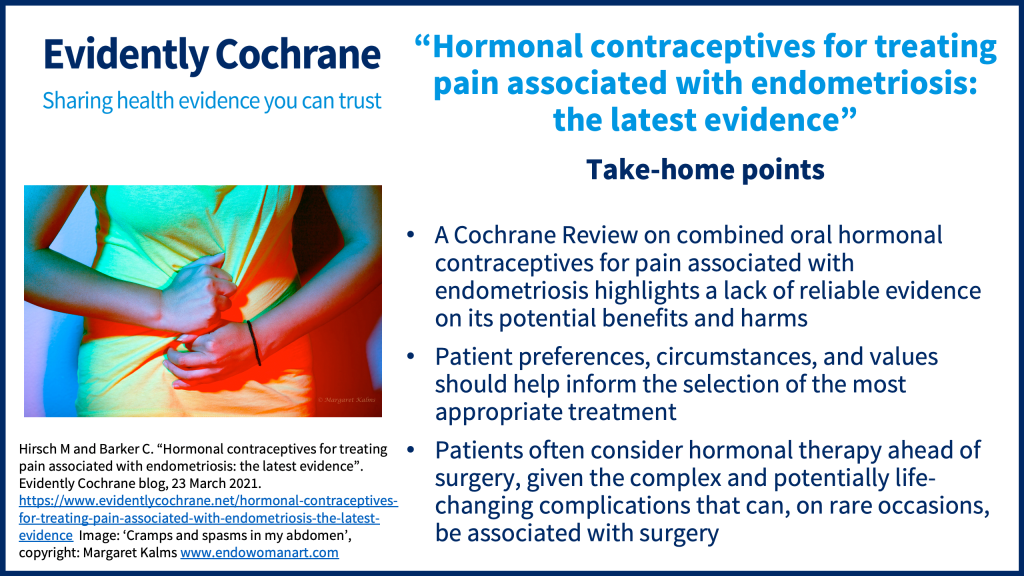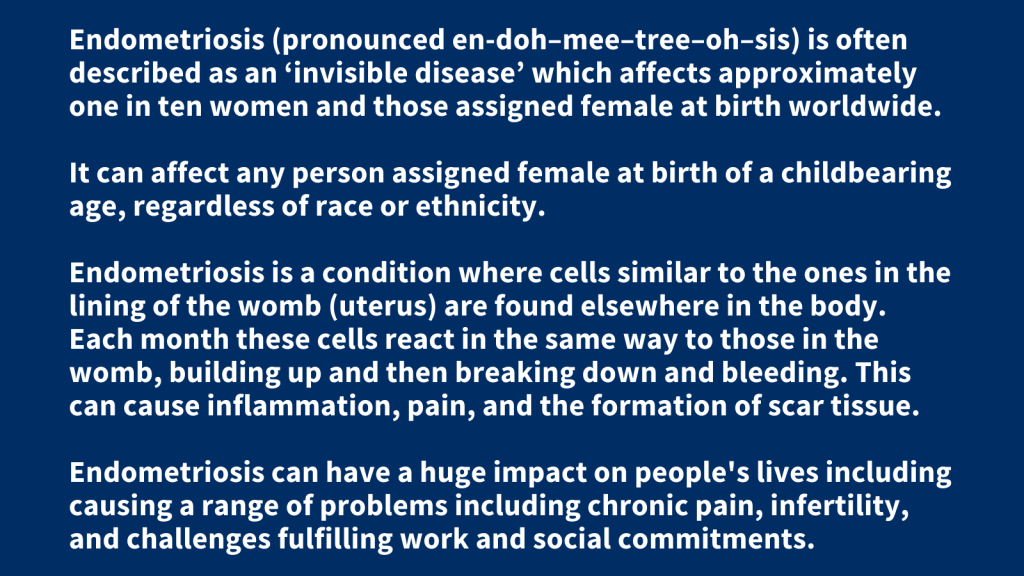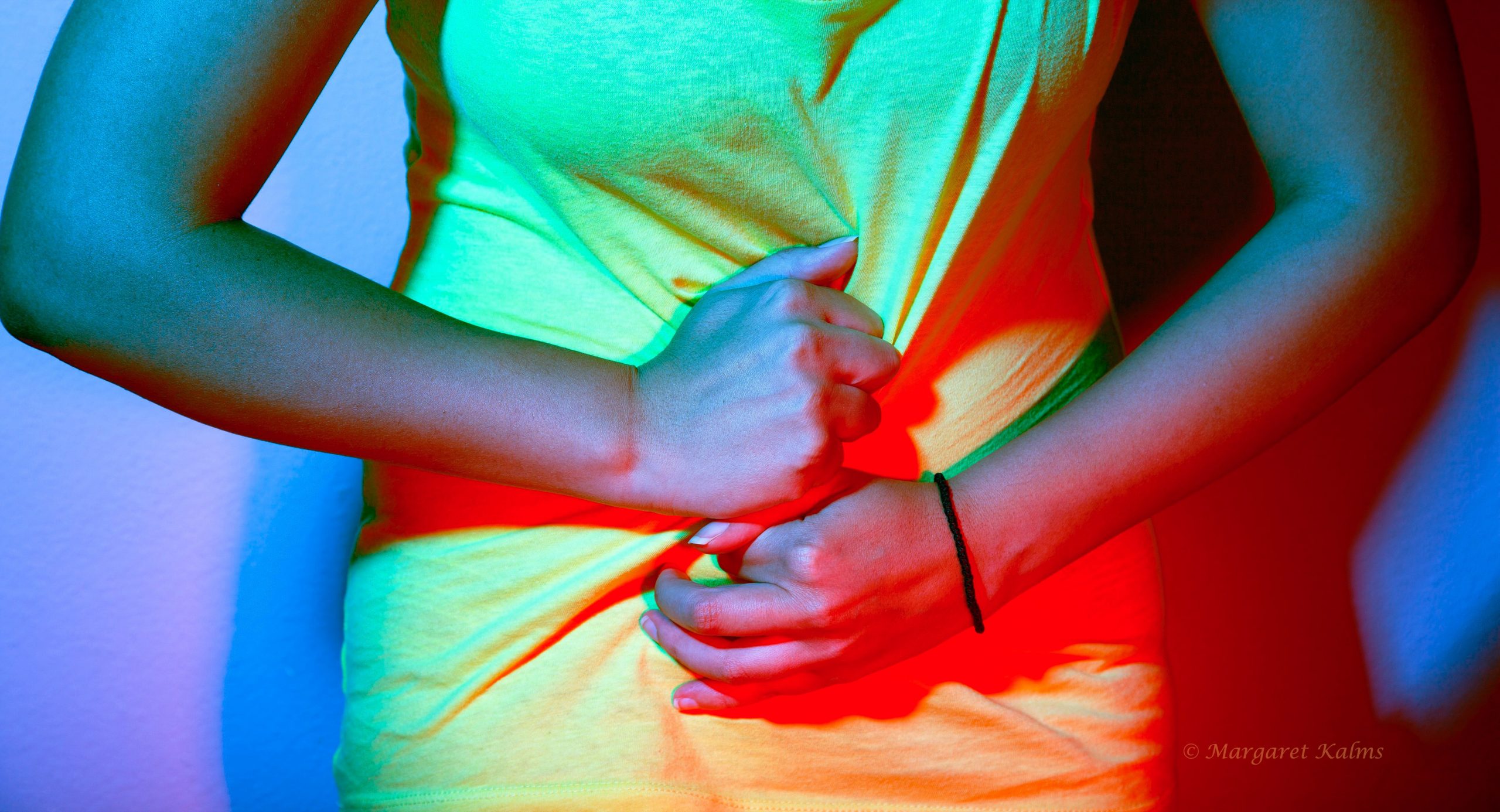In this blog for people with endometriosis, Claire Barker, who has been involved in endometriosis research as both a participantA person who takes part in a trial, often but not necessarily a patient. and a researcher, shares her experiences of using hormonal contraceptives for her endometriosis pain, and Dr Martin Hirsch, Locum Consultant Gynaecologist at Oxford’s John Radcliffe Hospital, discusses the latest Cochrane evidenceCochrane Reviews are systematic reviews. In systematic reviews we search for and summarize studies that answer a specific research question (e.g. is paracetamol effective and safe for treating back pain?). The studies are identified, assessed, and summarized by using a systematic and predefined approach. They inform recommendations for healthcare and research.. He reflects upon the side effects and effectivenessThe ability of an intervention (for example a drug, surgery, or exercise) to produce a desired effect, such as reduce symptoms. of these widely used treatments for pain associated with endometriosis.
This blog is the sixth in our #MyEndometriosisQuestion series running throughout March, with blogs about endometriosis and an invitation to ask your questions, which a panel of experts have been addressing throughout the month.
Featured image: ‘Cramps and spasms in my abdomen’ by Margaret Kalms* www.endowomanart.com
Page last checked 3 July 2023

What is endometriosis?

Claire’s story
From the day I started my periods, aged 11, they were excruciatingly painful. I vividly remember being awake all night in the shower sobbing with pain and being bent double gasping for breath in lessons at school. The pain would radiate throughout my abdomen, down my legs and into my lower back, leaving me incapable of doing or focusing on anything else. Looking back this was clearly a big red flag, but painful periods run in my family and I thought it was normal but that I was just unlucky.
After repeated visits to my GP, I was prescribed the combined oral contraceptive pill in my early teens. This seemed like a good option at the time as the combined pill seemed a familiar medication and taking it a low-risk strategy. It was certainly worth a try as a first port of call when I was in so much pain. The relief was stark and immediate, and I was grateful to be able to lead a much more normal life – going to school and participating in my beloved extracurricular activities like sport and drama. My periods were still more painful than my peers, but with ibuprofen and a hot water bottle they were manageable.
A huge benefit of this medication was being able to take it ‘back to back’ when required, thus preventing several important exams and holidays from being ruined by my period. However, the pill did little to prevent the increasingly debilitating fatigue I had experienced since puberty – a particularly nasty symptom of the endometriosis which I had not yet been diagnosed with.
While at university I started to experience random bleeding outside of my period, as well as bloating, and pain in my bowel and right shoulder. It was a really frightening and confusing time. These symptoms prompted a referral to several hospital specialities for testing and led to an eventual diagnosis of stage four endometriosis, 14 years after my symptoms first appeared. The disease was found in a wide number of places within my body including my ovaries, bowel, bladder and diaphragm.
At this time, I came off the combined oral contraceptive pill as I decided to opt for a surgical route for treatmentSomething done with the aim of improving health or relieving suffering. For example, medicines, surgery, psychological and physical therapies, diet and exercise changes. instead. I had two reasons for making this decision to come off the combined pill. Firstly, I was hoping to try for a baby, as my endometriosis had made me anxious about my fertility and hormones obviously impede this process. Secondly, the combined pill had stopped having much of a pain killing effect anyway by this point, so I was now willing to try a more radical route through surgery to relieve my pain symptoms.
Overall, I did find the combined oral contraceptive pill useful for helping me to manage my endometriosis pain. I know many people with endometriosis who I have met through my support group and advocacy work have found it helpful if they have been reluctant to have surgery or try more invasive methods like the Mirena coil. However, sometimes I wonder whether the hormones were just masking the disease as it grew worse inside me, and the benefits reduced the more severely my endometriosis developed.

Hormonal contraceptives: one option for endometriosis pain
For those with pain associated with endometriosis, like Claire, hormonal contraceptives are often a popular treatment choice as they are relatively safe compared with surgery. Hormonal contraception aims to reduce the stimulation of endometriosis cells caused by naturally produced hormones within the body. Please see the NICE patient decision aid on the diagnosis and management of endometriosis which describes the potential benefits and risks of treatment in greater detail.
What research evidence is available on hormonal contraceptives for pain?
The team at Cochrane Gynaecology and Fertility brought together all the available evidence from published research trialsClinical trials are research studies involving people who use healthcare services. They often compare a new or different treatment with the best treatment currently available. This is to test whether the new or different treatment is safe, effective and any better than what is currently used. No matter how promising a new treatment may appear during tests in a laboratory, it must go through clinical trials before its benefits and risks can really be known. evaluating hormonal contraceptives for the treatment of pain associated with endometriosis in a Cochrane ReviewCochrane Reviews are systematic reviews. In systematic reviews we search for and summarize studies that answer a specific research question (e.g. is paracetamol effective and safe for treating back pain?). The studies are identified, assessed, and summarized by using a systematic and predefined approach. They inform recommendations for healthcare and research. Oral contraceptives for pain associated with endometriosis (published May 2018). The research trials randomly allocated women with pain associated with endometriosis to a hormonal contraceptive, or a placeboAn intervention that appears to be the same as that which is being assessed but does not have the active component. For example, a placebo could be a tablet made of sugar, compared with a tablet containing a medicine. or other hormonal contraceptive. The team identified three research trials which included 404 women for analysis. Two trials compared a common combined contraceptive pill with placebo and one trial compared this combined contraceptive pill with another hormonal treatment which induces the medical menopause, a gonadotrophin releasing hormone analogue, Goserelin. All evidence used for the analysis was low- or very low-certaintyThe certainty (or quality) of evidence is the extent to which we can be confident that what the research tells us about a particular treatment effect is likely to be accurate. Concerns about factors such as bias can reduce the certainty of the evidence. Evidence may be of high certainty; moderate certainty; low certainty or very-low certainty. Cochrane has adopted the GRADE approach (Grading of Recommendations Assessment, Development and Evaluation) for assessing certainty (or quality) of evidence. Find out more here: https://training.cochrane.org/grade-approach, highlighting the lack of reliable evidence to support clinical decision making.
What are the side effects?
The evidence highlights that side effects from hormonal contraceptives may occur more than those who take placebo. The side effects reported include abnormal vaginal bleeding and nausea. When they compared the combined contraceptive pill with Goserelin, the side effects were comparable with the exception of hot flushes which occurred more commonly in women taking Goserelin.
Uncertainties remain about whether combined oral contraceptives are effective
After systematically reviewing the evidence, the review authors concluded there was insufficient evidence to make a judgement on the use of the combined oral contraceptives for the treatment of pain associated with endometriosis. There may be little to no difference in improvement comparing the combined contraceptive pills with other medical treatments such as Goserelin.
The number of patients globally who receive hormonal contraceptive treatment for pain associated with endometriosis is vast. Yet these treatments have been tested on just over 400 women in low-quality research. It is important to note that this does not necessarily mean that the treatments are less effective, however it means that more, high-quality research is needed to be certain of the effects. It is important that research in this area receives more funding.
Reflections from practice
In my personal practice I try to focus on achieving symptom-based priorities in partnership with patients, rather than eradication of the endometriosis. These goals can be pain control during a period, pain with intercourse, or pain with opening bowels. Many patients, like Claire, have concerns that medical treatments may mask the endometriosis symptoms rather than treat it. Unfortunately, we still know very little about the natural history of endometriosis and whether medical treatments allow the disease to grow while silencing the symptoms. This has been hampered by the invasive nature (surgery) of diagnosing and monitoring the condition.
I find combined hormonal contraceptives work well for a proportion of patients and I tend to recommend them initially as the risks of serious harm are less compared with surgery. I always want to ensure there is a follow up appointment as I know that not all patients will respond and see a benefit. In these cases, I would discuss the merits a different hormonal preparation versus the option of surgery.
For those patients I see where pain during a period is their principal symptom, I also discuss the option of using a medicine like ibuprofen. Despite there being a lack of high-quality evidence on ibuprofen, and drugs like it, it appears to work well and has been used for a long time. They can cause more side effects than paracetamol and it is recommended that patients discuss medication with their doctor before starting it.
Questions to ask your pain specialist
- Would hormonal contraceptives be an appropriate and effective treatment for me?
- What are the alternatives to hormonal contraceptives?
- What are the risks and benefits of all the treatment options available to me?
Support for people with endometriosis
There is a vibrant online community of women with endometriosis, commonly known as #endosisters, who share knowledge and offer support, along with charities such as Endometriosis UK and grassroots organisations such as Fair Treatment for the Women of Wales.
Further information about endometriosis
- Cochrane Gynaecology and Fertility: Endometriosis Awareness Month
- Endometriosis UK
- The British Society for Gynaecological Endoscopy (BGSE) maintains a list of accredited endometriosis centres.
References and further reading (pdf)
Claire Barker and Martin Hirsch have nothing to disclose.
*Images used with permission and cannot be reused without permission from the artists.

Join in the conversation on Twitter with @EndoLadyUK, @MartinHirsch100 @CochraneUK and @CochraneCGF or leave a comment on the blog.
Please note, we cannot give medical advice and do not publish comments that link to individual pages requesting donations or to commercial sites, or appear to endorse commercial products. We welcome diverse views and encourage discussion but we ask that comments are respectful and reserve the right to not publish any we consider offensive. Cochrane UK does not fact check – or endorse – readers’ comments, including any treatments mentioned.



lmao wish you had known this when the JR denied surgery for my endometriosis in 2013, saying it was ourely diagnostic. i don’t know what i would have done had i not been able to go privately